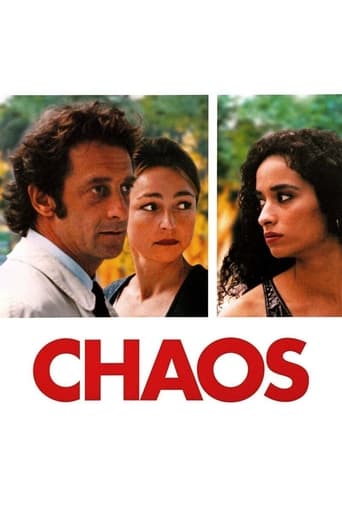Flyerplesys
Perfectly adorable
Spoonixel
Amateur movie with Big budget
RipDelight
This is a tender, generous movie that likes its characters and presents them as real people, full of flaws and strengths.
Sienna-Rose Mclaughlin
The movie really just wants to entertain people.
Q. Reyes
En route to a party, Paul (Vincent Lindon) and Helene (Catherine Frot) encounter a speed bump when a woman throws herself in front of their car, begging for help. Having learnt not to pick up hitchhikers, they watch helplessly as she is beaten unconscious by several men.Helene feels responsible for this stranger, whom she comes to know as Noemie, and spends much time with her at the hospital. But when she discovers that Noemie's life may be in danger, Helene sneaks her out of the hospital posing as a nurse.Taking her to her mother-in-law's country home to recover, she learns of Noemie's tragic story. Brought to France from Algeria by her father, she chooses a life of prostitution after her dad sold her down the river to an Algerian man.This movie tells me how prostitution works in France and its similarities in the prostitution that's been happening in our country.This is a funny and fast-paced movie. I would have enjoyed it more if I can only understand the French language.
jonr-3
What impressed me more than anything about "Chaos" was the energetic acting. The two female leads seem absolutely driven in their portrayals, and it's a good thing, because their characters need all the energy they can get to cope with the whirlwind of savagery and plot twists in this terrifically entertaining (though sometimes hard to watch) film.The only thing I disliked in "Chaos" was the cardboard portrayal of the husband. Though I consider myself a Francophile and have long enjoyed French films, I find French farce heavy-handed and really hard to take--and this role was handled farcically. But that's perhaps a cultural quibble, and overall I was greatly impressed by the film.Highly recommended, but not for the squeamish.
spokelse
Chaos is a gem, mostly undiscovered, very smart, every so often I see a movie that is simply great. A great melding of art and entertainment. This movie takes female rage and bonding seriously, but not stridently, very cool movie
Ralph Michael Stein
"Chaos" has been described by some reviewers as a French "Thelma and Louise." Not so. "Chaos" is that rare film seamlessly and believably meshing extreme violence and brutality with wry comedy. Its two female protagonists are winners in the great Game of Life (Thelma and Louise lost out on that score, big time).Helene (Catherine Frot) has a successful career and is married to a business-obsessed, vacuous, philandering fool, Paul (Vincent Landon). Their twenty year or so marriage has produced ample material comforts and a son, Fabrice (Aurelian Wiile), who's living proof that a kid can turn out to have less sensitivity and intelligence than your average Parisian poodle. If my son turned out like Fabrice...well, I can't even contemplate the possibility.On an evening out, Paul and Helene encounter a young woman desperately fleeing from three rabid pursuers. Paul locks the car doors leaving the hapless victim to endure a horrific beating, shown in all its gory. Paul's prime concern is to get his vehicle into a car wash (a pretty spiffy one at that) so the spattered blood on his windshield won't be noticed by police). A great citizen is he.Deeply disturbed by Paul's detached callousness, Helene seeks out the woman who is near death in an intensive care unit. Noemie (Rachida Brakni) is a prostitute who tried to run away from the gang of thugs who pimped her first on the street and then to high-income but low-class businessmen. Brakni's portrayal as a determined woman fighting death and the threat of lifelong disability is intense, involving and believable. She isn't The Happy Hooker - she's the surviving woman, her strength coming from a deep interior that even drug addiction can not erase.Helene plays an increasingly important role in helping Noemie to recover from her grievous wounds. It's neither a spoiler nor a surprise that they form a bond of trust and friendship and embark on a mission of ...what? Justice? Vengeance? Reparations? Director Coline Serreau unfolds the story in a well-filmed series of scenes that never lose the viewer's attention (at least I couldn't take my eyes off the screen).Paul and Fabrice could be seen as stereotypes of fatuous, self-indulgent, essentially helpless-without-women men except that they are soooo real. Helene is no victim - she understands her menfolk's foibles and her decisions are her own, not the product of male manipulation and dominance. Ms. Frot plays her role beautifully with slight facial expressions telling much.Yes, this is a film where most of the women (including Paul's neglected mom) are the Good Gals and the male characters start at jerks and work their way down the food chain to abusers and rapists. But the interplay between the domestic and romantic comedy and the abyss of forced prostitution and exploitation comes across as simply different sides of women's life experience. In that regard "Chaos" is quietly compelling.Noemi is from an Algerian family and the film swats at Islamic customs that demean women and control their destinies. I don't expect this movie to be a hit in Islamic countries. "Chaos" pulls few punches in depicting the reality of the bleak futures in store for girls raised in the ultra-materialistic and wholly bigoted families exemplified by Noemi's family.
8/10.

